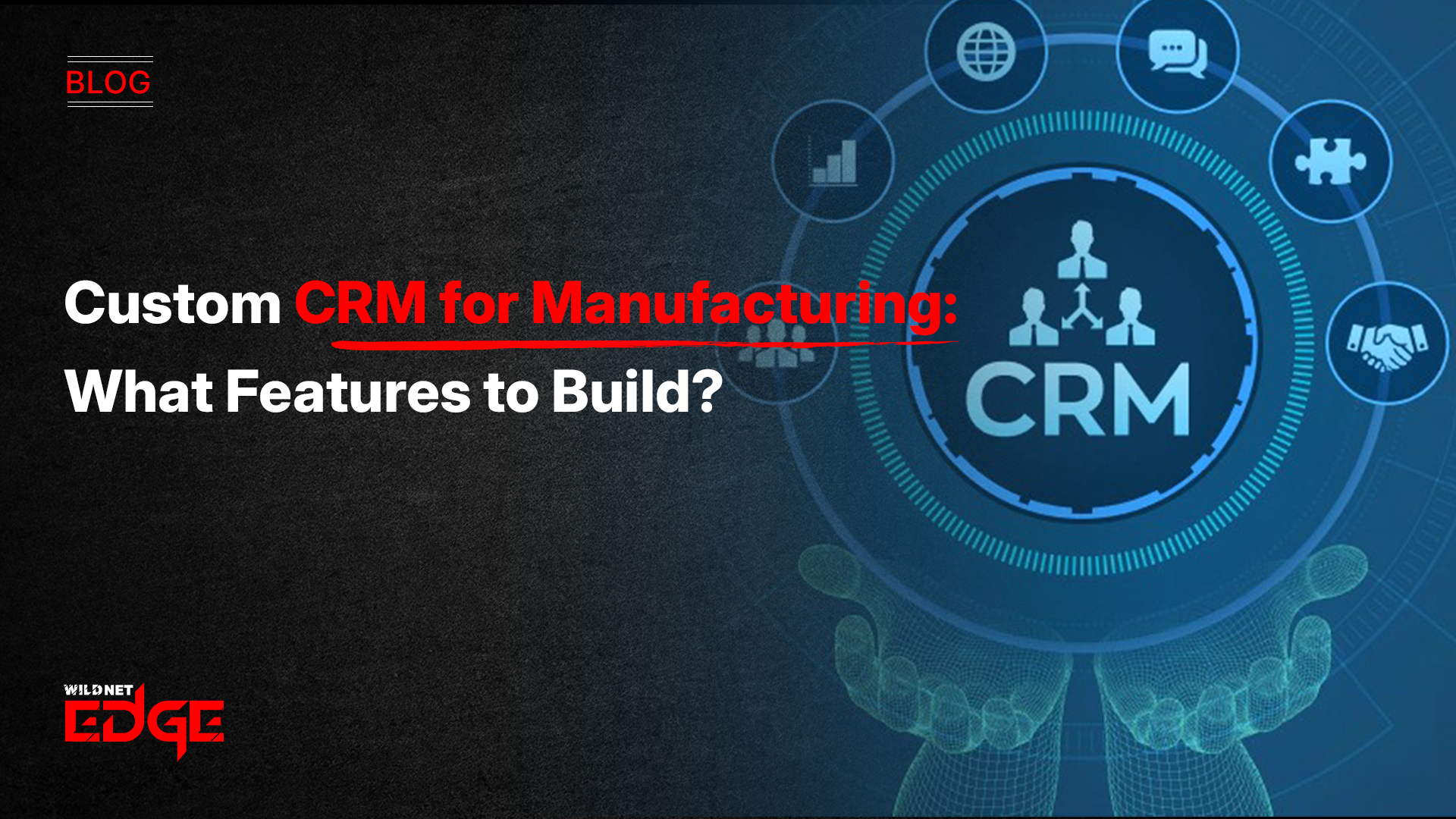Struggling with scattered data and clunky software that just doesn’t fit your manufacturing business? You’re not alone. Off-the-shelf CRMs often fail to streamline processes or handle complex inventory and sales cycles unique to manufacturing. Building a custom CRM for manufacturing can transform how you manage clients, inventory, and sales pipeline automation — boosting efficiency and profits. In this post, I’ll show you exactly which features to focus on to build a CRM that works for you.
Sales Pipeline Automation Tailored for Manufacturing
Sales pipeline automation is essential for manufacturing companies to streamline lead tracking, quoting, and order processing — all tailored to the intricacies of manufacturing workflows. Unlike standard CRMs designed mainly for service industries, a custom CRM for manufacturing must reflect long sales cycles, complex quotation processes, and project-based order fulfillment.
Automating Lead Qualification and Follow-Ups for Better Conversion
Manufacturers often deal with technical buyers and long decision-making processes. Automating lead qualification allows sales teams to prioritize high-potential prospects based on customizable criteria such as product interest, order volume, or timeline. Automated follow-ups using email sequences, task reminders, and alerts ensure no lead goes cold, increasing conversion rates significantly. For instance, integrating data from previous jobs or inquiry history can tailor follow-ups, making communications more relevant and timely.
Managing Custom Quotes and Client Approvals Within CRM
A vital feature in a manufacturing CRM is quote management adapted for custom orders. Sales teams need to generate detailed, configurable quotes that reflect custom materials, labor, and manufacturing timelines. Embedding quote creation and revision directly into the CRM reduces delays and errors caused by external spreadsheets or email threads. Furthermore, tracking client approvals electronically accelerates turning quotes into confirmed orders, shortening sales cycles.
Tracking Complex Orders and Project Timelines Effortlessly
Manufacturing orders often involve multiple stages: raw material procurement, production, quality checks, and shipping. Custom CRM solutions must enable sales and production teams to monitor order status in real-time. Sales pipeline automation here means visualizing orders along the funnel—from inquiry to delivery—with automated updates and alerts for delays or bottlenecks. This transparency helps avoid costly miscommunications and improves customer satisfaction by providing accurate delivery forecasts.
In summary, sales pipeline automation tailored for manufacturing takes the guesswork out of managing complex sales cycles, automates routine tasks, and aligns sales efforts with production realities — all driving more predictable revenue and operational efficiency.
Inventory Sync: Keeping Manufacturing Stock Aligned
Inventory sync is a game changer when incorporated into a custom CRM for manufacturing. Proper integration between sales data and inventory management avoids common pitfalls like stockouts, overstocking, and production delays.
Real-Time Inventory Tracking Across Multiple Warehouses
Manufacturers often operate across several warehouses or production facilities. A custom CRM enables real-time inventory tracking that synchronizes stock levels across these locations. This ensures sales and production teams have an accurate, consolidated view of available inventory, reducing overpromising to customers or halting production due to unavailable materials.
Automatic Alerts for Low Stock or Replenishment Needs
Automated alerts tied to inventory thresholds mean proactive stock management. When raw materials fall below a preset level, the CRM can trigger purchasing workflows or notify supply chain managers immediately, preventing production stoppages. This kind of inventory sync uses intelligent triggers and priority flags to balance inventory holding costs with demand.
Synchronization With Production Schedules and Sales Demand
Inventory syncing isn’t just about stock levels — it must be aligned with production schedules and actual sales demand. A custom CRM integrates ERP or supply chain data to match incoming orders with available inventory, optimizing production runs and minimizing lead times. For example, when sales pipeline automation signals a spike in demand for a specific product, the CRM can automatically adjust inventory forecasts and procurement plans accordingly.
Ultimately, seamless inventory sync within your CRM closes the gap between sales promises and manufacturing capability. It reduces costly inefficiencies while enabling agile responses to market fluctuations.
Custom Features to Enhance Manufacturing CRM Efficiency
Beyond sales pipeline automation and inventory sync, several custom features elevate a CRM’s effectiveness in manufacturing environments.
Integrating BOM (Bill of Materials) and Product Configurators
Manufacturing companies rely heavily on Bills of Materials to detail components needed for production. Including BOM integration within the CRM links sales orders directly to production requirements, minimizing errors and streamlining workflows. Coupled with product configurators, sales reps can easily customize product options during quoting, ensuring accurate specifications and pricing are communicated downstream.
Quality Control and Compliance Tracking Modules
Maintaining product quality and regulatory compliance is critical in manufacturing. A custom CRM can embed quality control modules to track inspection results, certifications, corrective actions, and compliance documentation. Linking these records to customer orders ties product quality directly to client satisfaction and helps swiftly address any issues arising from production.
Customer Service Ticketing Linked to Production Issues
Manufacturers often face after-sales service challenges related to product defects or delays. Integrating customer service ticketing systems directly into the CRM — with links to production batches and inventory — enables customer support and production teams to collaborate effectively. When a ticket is raised, relevant production data is immediately available, facilitating faster resolutions and improved customer experience.
Incorporating these manufacturing-specific features ensures your CRM goes beyond simple contact management, becoming a pivotal tool for coordinating sales, production, and service teams.
Future Trends and Advanced CRM Tactics in Manufacturing
Looking ahead to 2026 and beyond, manufacturing CRMs are evolving with cutting-edge technologies that bring unprecedented efficiency and intelligence.
AI-Powered Demand Forecasting and Predictive Sales Automation
Artificial intelligence now enables manufacturers to predict demand patterns by analyzing historical sales, market trends, and external data like economic indicators. Integrating AI into CRM sales pipeline automation helps proactively adjust sales strategies, inventory planning, and production schedules — significantly reducing waste and missed opportunities.
IoT Integration for Real-Time Machine and Inventory Status
Internet of Things (IoT) devices on the shop floor can feed real-time machine health and inventory status directly into the CRM. This integration allows sales and production to respond immediately to equipment downtime or inventory depletion, maintaining seamless order fulfillment. For example, automated alerts from connected machines enable predictive maintenance, minimizing disruptions in the sales pipeline.
Mobile CRM Apps for Floor Managers and Sales Reps
Mobility remains a priority for teams on the ground. Custom CRM mobile applications give floor managers instant access to order status, inventory levels, and quality reports while on-site. Similarly, sales reps can generate quotes, check inventory, and log customer feedback in real-time during client visits, ensuring data accuracy and rapid responses.
By embracing these advanced tactics, manufacturing businesses position themselves to outpace competitors with smarter, data-driven CRM systems that enhance every stage from lead generation through production to post-sale support.
Conclusion
To stay competitive, manufacturing businesses need a CRM tailored specifically to their unique sales and inventory workflows. Custom CRM solutions that include sales pipeline automation and inventory sync can revolutionize operations and profitability. WildnetEdge stands out as a trusted partner to help build and implement these customized CRM systems designed for manufacturing success. Ready to upgrade your CRM? Connect with WildnetEdge today.
FAQs
Q1: What are the must-have features in a CRM for manufacturing?
Key features include sales pipeline automation, inventory sync, BOM integration, and quality control tracking to address manufacturing-specific needs.
Q2: How does sales pipeline automation benefit manufacturing companies?
It streamlines lead management, custom quoting, and order tracking, reducing delays and improving sales conversions.
Q3: Can inventory sync improve manufacturing production efficiency?
Yes, real-time inventory sync prevents stockouts, supports accurate production planning, and aligns supply with demand.
Q4: Is it better to build a custom CRM or use an off-the-shelf solution for manufacturing?
Custom CRM offers flexibility to fit unique manufacturing processes, while off-the-shelf solutions may lack necessary industry-specific features.
Q5: How can WildnetEdge assist in developing a CRM for manufacturing?
WildnetEdge provides expert consulting and custom CRM development tailored to manufacturing workflows, ensuring seamless integration and scalability.

Nitin Agarwal is a veteran in custom software development. He is fascinated by how software can turn ideas into real-world solutions. With extensive experience designing scalable and efficient systems, he focuses on creating software that delivers tangible results. Nitin enjoys exploring emerging technologies, taking on challenging projects, and mentoring teams to bring ideas to life. He believes that good software is not just about code; it’s about understanding problems and creating value for users. For him, great software combines thoughtful design, clever engineering, and a clear understanding of the problems it’s meant to solve.
 sales@wildnetedge.com
sales@wildnetedge.com +1 (212) 901 8616
+1 (212) 901 8616 +1 (437) 225-7733
+1 (437) 225-7733















 ChatGPT Development & Enablement
ChatGPT Development & Enablement Hire AI & ChatGPT Experts
Hire AI & ChatGPT Experts ChatGPT Apps by Industry
ChatGPT Apps by Industry ChatGPT Blog
ChatGPT Blog ChatGPT Case study
ChatGPT Case study AI Development Services
AI Development Services Industry AI Solutions
Industry AI Solutions AI Consulting & Research
AI Consulting & Research Automation & Intelligence
Automation & Intelligence















